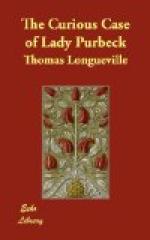Bridget had not been in her grave four months when the great Lord Burghley died. Coke attended his funeral, and a funeral being obviously a fitting occasion on which to talk about that still more dreary ceremony, a wedding, Coke took advantage of it to broach the question of a marriage between himself and Lady Elizabeth Hatton. He broached it both to her father, the new Lord Burghley, and to her uncle, the much more talented Robert. Whatever their astonishment may have been, each of these Cecils promised to offer no opposition to the match. They probably reflected that the Attorney-General was a man in a powerful position, and that, with his own great wealth combined with that of Lady Elizabeth Hatton, he might possibly prove of service to the Cecil family in the future.
How the match, proposed under such conditions, came about, history does not inform us, but, within six months of Bridget’s funeral, her widower embalmed her memory by marrying Elizabeth Hatton, a girl fifteen years her junior.
If any writer possessed of imagination should choose to make a novel on the foundation of this simple story, he may describe to his readers how the cross-grained and unattractive Coke contrived to induce the fair Lady Elizabeth Hatton to accept him for a husband. The present writer cannot say how this miracle was worked, for the simple reason that he does not know. One incident in connection with the marriage, however, is a matter of history. Elizabeth was not sufficiently proud of her prospective bride-groom to desire to stand beside him at a wedding before a large, fashionable, and critical assemblage in a London church. If he would have her at all, she insisted that he must take her in the only way in which he could get her, namely, by a clandestine marriage, in a private house, with only two or three witnesses.
Now, if there was one thing more than another in which Mr. Attorney Coke lived and moved and had his being, it was the law, to all offenders against which he was an object of terror; and such a great lawyer must have been fully aware that, by making a clandestine marriage in a private house, he would render himself liable to the greater excommunication, whereby, in addition to the minor annoyance of being debarred from the sacraments, he might forfeit the whole of his property and be subjected to perpetual imprisonment. To make matters worse, Archbishop Whitgift had just issued a pastoral letter to all the bishops in the province of Canterbury, condemning marriages in private houses at unseasonable hours, and forbidding under the severest penalties any marriage, except in a cathedral or in a parish church, during the canonical hours, and after proclamation of banns on three Sundays or holidays, or else with the license of the ordinary.




